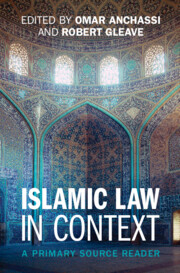Book contents
- Islamic Law in Context
- Islamic Law in Context
- Copyright page
- Contents
- Acknowledgements
- Contributors
- Introduction
- Part I Islamic Legal Theory (Uṣūl al-Fiqh) and Related Genres
- Part II Islamic Jurisprudence (Fiqh) and Related Genres
- Chapter 7 Introduction to Part II
- Chapter 8 The Kitāb al-Umma, or Ṣaḥīfat al-Madīna
- Chapter 9 Section on Lawful Food from al-Mabsūṭ fī Fiqh al-Imāmiyya of Muḥammad b. al-Ḥasan al-Ṭūsī (d. 460/1067)
- Chapter 10 ‘The Treatise of Refutation of those who Criticise [Our] Conduct’ (Kitāb al-Radd ʿalā man Ṭaʿana fī l-Sīra) Attributed to Imām al-Mutawakkil ʿalā Allāh, Aḥmad b. Sulaymān (d. 566/1170)
- Chapter 11 Menstruating Women and Visiting the Mosque
- Chapter 12 Section on the Law of Rebellion from the Radd al-Muḥtār of Ibn ʿĀbidīn (d. 1252/1836)
- Chapter 13 Offer and Acceptance in Islamic Marriage
- Chapter 14 Treatise on Jihad and Migration
- Chapter 15 Alms Tax (Zakāt) in Shīʿī Law
- Chapter 16 A Difficult Case of Divorce
- Part III Legal Opinions (Fatwās)
- Part IV Court Judgments and Other Court Documentation
- Part V Judicial Manuals and Reference Books
- Part VI Alternative Sources for Islamic Legal Studies
- Name Index
- Subject Index
- References
Chapter 11 - Menstruating Women and Visiting the Mosque
A Summary Text from Muḥyī al-Dīn al-Nawawī (d. 676/1278) with Commentary and Glosses
from Part II - Islamic Jurisprudence (Fiqh) and Related Genres
Published online by Cambridge University Press: 14 November 2024
- Islamic Law in Context
- Islamic Law in Context
- Copyright page
- Contents
- Acknowledgements
- Contributors
- Introduction
- Part I Islamic Legal Theory (Uṣūl al-Fiqh) and Related Genres
- Part II Islamic Jurisprudence (Fiqh) and Related Genres
- Chapter 7 Introduction to Part II
- Chapter 8 The Kitāb al-Umma, or Ṣaḥīfat al-Madīna
- Chapter 9 Section on Lawful Food from al-Mabsūṭ fī Fiqh al-Imāmiyya of Muḥammad b. al-Ḥasan al-Ṭūsī (d. 460/1067)
- Chapter 10 ‘The Treatise of Refutation of those who Criticise [Our] Conduct’ (Kitāb al-Radd ʿalā man Ṭaʿana fī l-Sīra) Attributed to Imām al-Mutawakkil ʿalā Allāh, Aḥmad b. Sulaymān (d. 566/1170)
- Chapter 11 Menstruating Women and Visiting the Mosque
- Chapter 12 Section on the Law of Rebellion from the Radd al-Muḥtār of Ibn ʿĀbidīn (d. 1252/1836)
- Chapter 13 Offer and Acceptance in Islamic Marriage
- Chapter 14 Treatise on Jihad and Migration
- Chapter 15 Alms Tax (Zakāt) in Shīʿī Law
- Chapter 16 A Difficult Case of Divorce
- Part III Legal Opinions (Fatwās)
- Part IV Court Judgments and Other Court Documentation
- Part V Judicial Manuals and Reference Books
- Part VI Alternative Sources for Islamic Legal Studies
- Name Index
- Subject Index
- References
Summary
This chapter discusses the question of menstruating women and their exclusion (or otherwise) from mosques as featured in the al-Minhāj of the massively influential jurist Muḥy al-Dīn al-Nawawī (d. 676/1278), along with subsequent commentaries (sing. sharḥ) and glosses (pl. ḥawāshī) on his work. Certain religious duties (such as prayer and fasting) are not permitted during a woman’s menstrual period; sexual intercourse is also forbidden for her; more controversially, visiting (or passing through) the mosque is also (for some) forbidden (or at least discouraged). The text excerpted in this chapter explores various positions on the subject and the arguments for and against them put forward by past jurists of the school. Some space is taken up by an extended discussion of analogous cases to that of a menstruating woman entering a mosque.
Keywords
- Type
- Chapter
- Information
- Islamic Law in ContextA Primary Source Reader, pp. 121 - 131Publisher: Cambridge University PressPrint publication year: 2024

